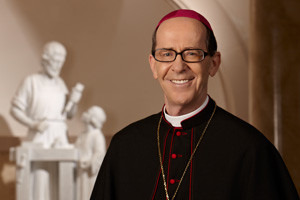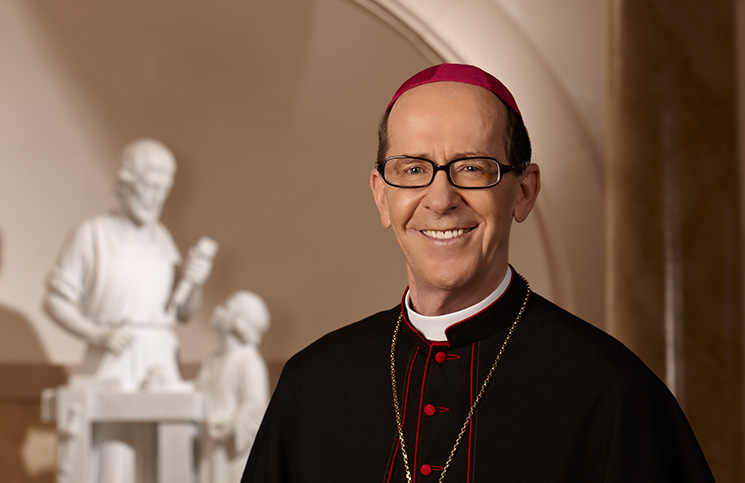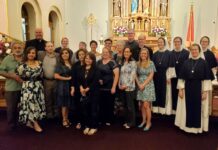In recent weeks we looked at the first three of eight tasks Catholics need to be about in order effectively to bear witness to Christ at this time in America. Last time, we considered these three: trust the truth, live God’s plan for marriage and be pure of heart. All these tasks are needed to confront the relativism of our time.
Today, we shall look at two more: Make Sunday the center of our life and defend the life and dignity of all persons. These two tasks deal with current American cultural misconceptions of time and personhood, two concepts for which we must always retain a deep reverence and an appreciation of mystery if we are to become fully human and have a society that is likewise fully human.

4. Make Sunday the center of our life.
“Teach us to number our days aright, that we may gain wisdom of heart” (Psalm 90, vs12). As Americans, we tend to value a concept of time which the Ancient Greeks called kronos — calculable, secular time, while we undervalue kairos — sacred time. We see this most clearly in “the weekend,” which for many Christians has become a mere two-day break from labor, and in which the sacred time for worship on Sunday is often seen as a bothersome interruption. In this regard, Blessed John Paul II wrote in his Apostolic Letter on the Day of the Lord (#4), “Unfortunately, when Sunday loses its fundamental meaning and becomes merely part of a ‘weekend’, it can happen that people stay locked within a horizon so limited that they can no longer see ‘the heavens’.” God created us to see the heavens, not merely to have a flattened-out sense of time. For this to happen, Sunday is key.
Sunday has always played a pivotal role in the identity and mission of Christians, including in their lives as public citizens. When Sunday Mass stands at the center of one’s life, all else finds meaning and purpose; other things get directed with right order. When Sunday is not at the center, when faith becomes lukewarm, it is impossible to be faithful to Christ in one’s personal life or in the public square.
Blessed John Paul II wrote this about Sunday (Ibid, #7), “The rediscovery of this day is a grace which we must implore, not only so that we may live the demands of faith to the full, but also so that we may respond concretely to the deepest human yearnings. Time given to Christ is never time lost, but is rather time gained, so that our relationships and indeed our whole life may become more profoundly human.”
Time given to Christ is never time lost! Sunday Mass is a personal encounter with Jesus in which He gives us a share in His own life and provides us the grace we need to live as His faithful witnesses in the world. Only the Maker of time can teach us time’s true meaning. He does this when we have the wisdom to place our days, especially our Sundays, in His hands with boundless trust.
At the Second Vatican Council, the Sacred Liturgy was defined as “a sacred action surpassing all others; no other action of the Church can equal its efficacy” (Sacrosanctum Concilium, #7). How can a culture, then, be transformed by followers of Christ unless their lives are built around the Eucharistic Sacrifice?
5. Defend the life and dignity of all persons.
We are the generation of Catholics that, more than any other in our history, has been given the duty and privilege of defending the life and dignity of every human person. This duty is of utmost importance since the stakes are so high and the present tragedy is so atrocious. A nation that kills a million of its unborn children each year is a nation that has lost its bearings. As long as our country continues down this path, the life and dignity of other vulnerable persons are also gravely threatened — from the elderly to infants and persons with special needs. We also risk becoming a people too weak and self-absorbed to assist others in desperate need, from the migrant and the poor to the thousands of children in foster care.
The pursuit of justice is a sham when it does not include justice for the most vulnerable. As Benedict XVI said (Caritas in Veritate, #15), “…a society lacks solid foundations when, on the one hand, it asserts values such as the dignity of the person, justice and peace, but then, on the other hand, radically acts to the contrary by allowing or tolerating a variety of ways in which human life is devalued and violated, especially where it is weak or marginalized.”
More than at any time in our nation’s history, the witness of Catholics is needed to be a counter-force to the flattened concepts of the human person — purely consumerist, secularist and utilitarian views of human life. By faith, we know that each human person is mysteriously and personally loved by God Himself.
While much work remains to be done, we should also be encouraged by the efforts of so many to protect innocent human life. In particular, we have been blessed in Arizona with the enactment of numerous pro-life laws in recent years. The enactment of these laws, in conjunction with educational awareness, steadfast prayer, fasting and other worthy efforts, has resulted not only in the closing of abortion clinics but also in a verifiable reduction in the number of abortions performed in Arizona over the last year. In addition, hospice care that is faithful to the ethical and religious directives of the American Bishops has come to our diocese to protect the dignity of the dying; and our immigrant brothers and sisters have received services which teach them English and prepare them for U.S. citizenship. I am truly grateful for these and all similar efforts.
It is our privilege and mission from God to proclaim the Gospel of Life today, to stand up for the life and dignity of the most vulnerable among us, and to work with others of good will to secure the right to life of all.
Next time, we shall continue this series on being American and Catholic, by looking at two more tasks that are ours at this time in history: to promote the common good with charity, and to be merciful yet fearless.






![[VIDEO] Make Sunday feel like Sunday again](https://www.catholicsun.org/wp-content/uploads/2021/04/2021-YOUTUBE-BISHOP-MESSAGE-THUMBNAIL-ENGLISH-218x150.png)
